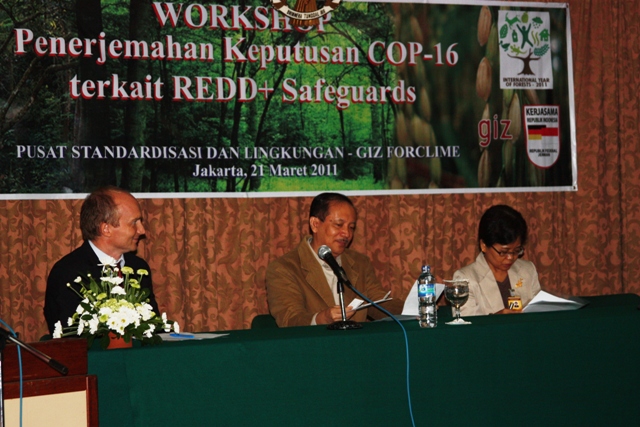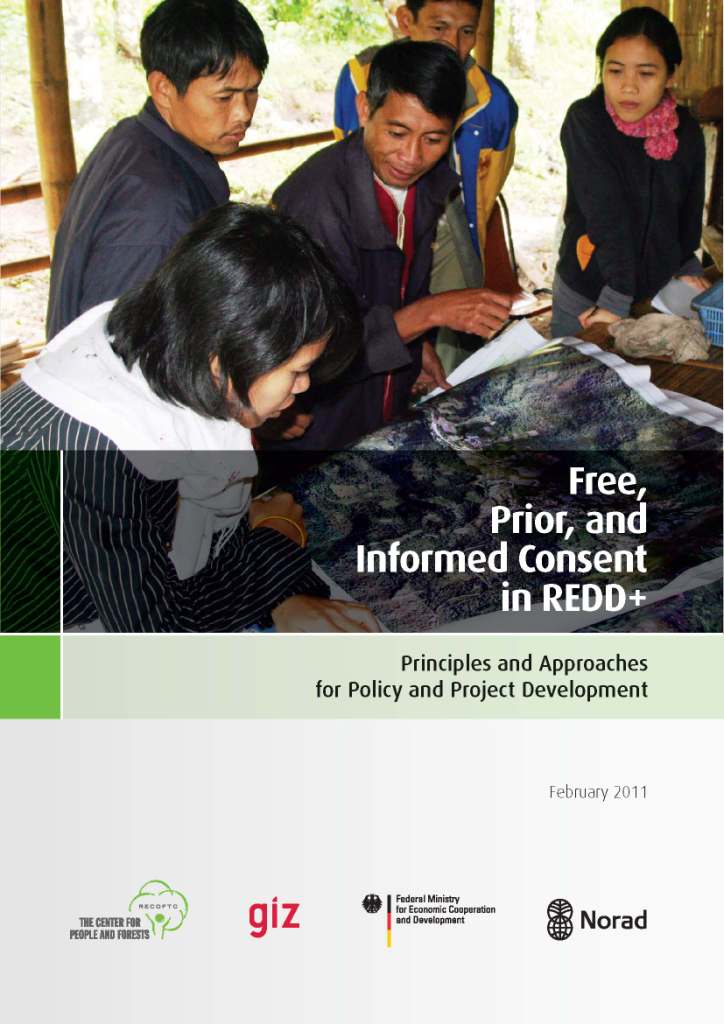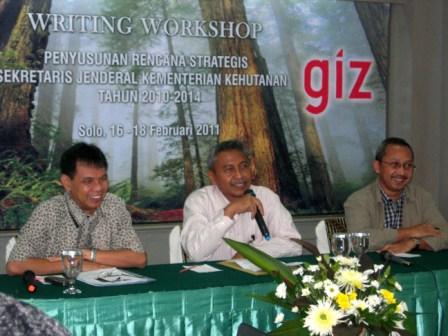FORCLIME
Forests and Climate Change ProgrammeTechnical Cooperation (TC Module)

Select your language

On 21 March the Ministry of Forestry supported by the FORCLIME Programme conducted a workshop on REDD+ Safeguards as a follow-up to the UNFCCC COP 16 Decision. The workshop was opened by the Secretary General, Dr. Hadi Daryanto, and the Head of Development Cooperation of the Embassy of the Federal Republic of Germany, Mr. Andreas Beckermann.
The objective of the workshop was twofold: On the one hand it aimed at collecting ideas on how the REDD+ social, environmental as well as rights- and governance-related safeguards mentioned in the COP 16 Decision can be translated into the national context. On the other hand its purpose was to identify elements which need to be monitored as part of a national information system on REDD+ safeguards as stipulated in the decision.
About 100 participants from central and regional government, private sector, CSOs and NGOs, academia and international partners learned about instruments and procedures already in use as safeguards in forest and land management in Indonesia ranging from AMDAL to social safeguards contained in the legal framework. In the afternoon session their relevance, strengths and weaknesses with regard to REDD+ were discussed and elements identified which are needed for measuring and monitoring their implementation. The workshop will be followed up by further steps to develop an information system on REDD+ safeguards, to be taken by the Ministry’s Center for Standardisation and Environment supported by FORCLIME and involving further public consultations, so as to provide input into the deliberations of the parties to the UNFCCC at the international level.

On 1 March 2011 Deutsche Gesellschaft für Internationale Zusammenarbeit (GIZ) and the Center for People and Forests (RECOFTC) launched a Guidebook on “Free, prior and informed consent in REDD+: Principles and Approaches for Policy and Project Development” at a regional GIZ conference in Bangkok. The publication has been developed jointly by the GIZ Sector Network Natural Resources and Rural Development – Asia and RECOFTC’s Grassroots Capacity Building Program for Reducing Emissions from Deforestation and forest Degradation (REDD) in the Asia-Pacific Region with the involvement of a consortium of NGOs and CSOs working on REDD+ projects or on indigenous rights in the region.
Put simply, “free, prior and informed consent” (FPIC) is the right of indigenous peoples to say “yes, and how” or “no” to developments affecting their resources and territories. It is based in international and in some countries also in national law. Its legal status has been strengthened through the adoption of the UN Declaration on the Rights of Indigenous Peoples (UNDRIP) in 2008. Originating in the right of indigenous peoples to self-determination it is increasingly being extended to all local communities with historic or customary connection to the land and resources they use. FPIC is discussed as one of several safeguards for REDD+.
The guidebook describes what it takes to respect the right to free, prior and informed consent in REDD+ projects and programmes. During the launch GIZ practitioners, staff members of RECOFTC and Bangkok-based representatives of the global UN-REDD programme discussed the challenges involved in following such a rights-based approach with questions centering around at what level processes to respect the right to FPIC are feasible and how they relate to national legal frameworks.
The FORCLIME programme will soon provide an Indonesian language version of the guidebook.
The guidebook can be downloaded here: FPIC in REDD

The Secretariat General of the Ministry of Forestry through the Planning Bureau held a writing workshop on Strategic Plan (Renstra) of the Secretariat General on 16-18 February 2011 in Solo, Central Java. The purpose of the writing workshop was to translate the Ministry of Forestry Strategic Plan 2010-2014 into details relating to the duties and functions of the Secretariat General. Workshop participants were key officials and key technical staff whose tasks deal with planning at the echelon 2 of the Secretariat General, which consists of 13 units, as well as officers from other echelon 1 who were invited as resource persons and observers. This event was an initiative of the Planning Bureau of the Ministry of Forestry and supported and facilitated by the FORCLIME Programme.
The result of the workshop is a more detailed work plan at the lower unit level under the Secretariat General. Through a detailed work plan the achievement of the Ministry of Forestry Strategic Plan targets may well be assured, and it will be easier to conduct monitoring and evaluation.
For more information related to the Strategic Plan of the Secretariat General of the Ministry of Forestry may contact:
Ir. Waspodo, MP
Head of the Forestry General Plan
Planning Bureau of Forestry
Manggala Wanabakti, Blok VII Lantai 2
Jalan Jendral Gatot Subroto, Jakarta
Dedi Haryadi, MSc.
National Coordinator FORCLIME
Tel. +62-21-5720214
Email: dedi.haryadi@giz.de
 |
Supported By: |
  |